Forester is one of the best known names in majolica yet most people couldn't identify a piece if it fell in their lap. One of the reasons for this is that Forester marked few of their majolica wares. In fact, much of what we now recognize as Forester is from ads advertising the company. That's unfortunate because their output was prodigious and they deserve recognition for creating many of the wares we see for sale today.
Thomas Forester 1832-1907
Thomas Forester was born in 1832 in Lancashire, England into a pottery family. His father worked at Mintons where Thomas joined his father working as a young man as a presser. In time, he honed his skill by moving to the Victoria Works before eventually joining Wardle & Co. By this time he had gained sufficient experience to be offered a management position. He then left England and gained employment as a manager at Peterinck & Son in Belgium.
In 1877 he returned home with sufficient capital to establish his own pottery, the Church Street Majolica Works. After modest early success he demolished the facility after two years to build a significantly larger pottery which he named the Phoenix Works.
The Phoenix Works
At the age of fifty, he brought his two youngest sons Herbert and Victor into the business and further expanded his facility into an adjoining factory, nearly doubling his space. Forester & Sons was now one of the largest potteries in Stoke-on-Trent.
The company specialized in majolica ware but potted utilitarian and other decorative earthenware as well. As styles shifted so did the company's output.
Forester showroom 1890
Thomas Forester & Sons invoice letterhead
Most Forester majolica is unmarked but fortunately for their vigorous advertising in trade journals we can identify some of their patterns today. Forrester also purchased other failed potteries such as
Samuel Lear's pottery and the
Victoria Pottery Company and continued issuing their lines of majolica patterns.
A contemporary account of Forester's work in The Pottery Gazette read thus:
Mr. THOMAS FORESTER– A visit to the new manufactory of this enterprising gentleman amply repaid us for the trouble taken, and the new things just emerged or emerging into life were well worthy of inspection.
In most, if not in all cases, the colours employed in the decoration were bright, and artistically displayed.
Among his more modern designs are a cockatoo basket of a triangular shape, well adapted for corners, &c., the birds being brightly-tinted, on variously-coloured grounds. A very handsome piece of majolica pottery is the medallion jardiniere, oval in shape, coloured in dark blue, yellow, and pink, measuring: twenty inches in length, with flowerpots to match.
Another jardinière, some sixteen inches long, called the Roman jardinière, is equal in many points to the former; but for massive workmanship and effective colouring the former, perhaps, stands first. I also noticed several new designs in baskets, including primrose, Japanese, Greek, and rustic, all of which were effectively decorated. His new cockatoo jugs are very showy and worthy of notice.
The Dolphin vase is another very fine specimen of pottery, consisting of three dolphins supporting a cornucopia vase, the whole standing some sixteen inches high. Perhaps not the least among Mr. Forrester's novelties may be considered his latest style of decorating majolica, which consists of innumerably and variously coloured spots upon either a dark or light coloured groundwork.
The specimens we saw were very effective, and have already commanded large sample orders.

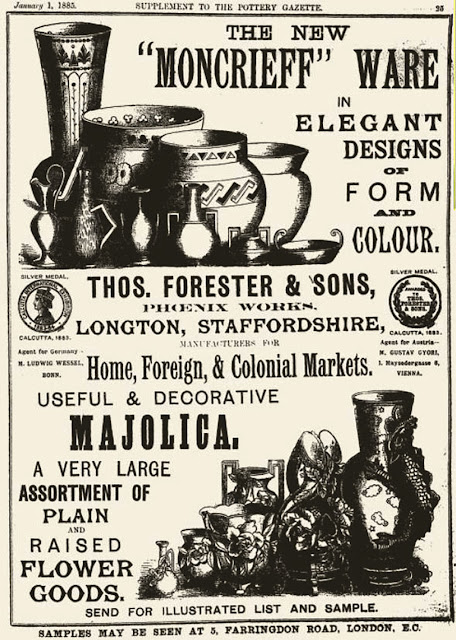
Forester advertisement from the Pottery Gazette
Forester advertisement from the Pottery Gazette

Forester advertisement from the Pottery Gazette
Advertisement from the July 2,1883 issue of The Pottery Gazette
Mr. THOMAS FORESTER.-A visit to the new manufactory of this enterprising gentleman amply repaid us for the trouble taken, and the new things just emerged or emerging into life were well worthy of inspection.
In most, if not in all cases, the colours employed in the decoration were bright, aud artistically displayed. Among his more modern designs are a cackatoo basket of a triangular shape, well adapted for corners, &c., the birds being brightly-tinted, on variously-coloured grounds. A very handsome piece of majolica pottery is the medallion jardiniere, oval in shape, coloured in dark blue, yellow, and pink, measuring: twenty inches in length, with flowerpots to match. Another jardinière, some sixteen inches long, called the Roman jardinière, is equal in many pointe to the former; but for massive workmanship and effective colouring the former, perhaps, stands first. I also noticed several new designs in baskets, including primrose, Japanese, Greek, and rustic, all of which were effectively decorated. His new cockatoo jugs are very showy and worthy of notice.
The Dolphin vase is another very fine specimen of pottery, consisting of three dolphins supporting a cornucopia vase, the whole standing some sixteen inches high. Perhaps not the least among Mr. Forrester's novelties may be considered his latest style of decorating majolica, which consists of innumerably and variously coloured spots upon either a dark or light coloured groundwork.
The specimens we saw were very effective, and have already commanded
Contemporary description of the wares at Forester

Forester cheese bell was designed by Joseph Roth from who
they purchased the molds
Forester majolica cheese bell
Forester majolica crown cheese bell designed for Victoria's 1897 Jubilee
Forester butterfly lip pitcher later copied by the Etruscan Works
Forester majolica overlapping leaf plate
Thomas Forester majolica overlapping begonia leaf bowl
Forester majolica overlapping leaf dessert stand
Forester majolica overlapping leaf dessert stand
Forester majolica bamboo cuspidor
Forester majolica pug dog humidor
Forester garden seat
Forester majolica garden seat
Forester majolica fish plate
Forester majolica sardine box
Forester majolica sardine box
Forester majolica sardine box
Forester majolica sardine box
Forester majolica bird & basketweave jug
Forester majolica owl pitcher
Forester majolica elephant pitcher
Forester majolica cat basket
Forester majolica drinking pig jug
Forester majolica woman holding pig jug
Forester majolica Father Christmas jug.
Also made by Shorter & Sons
Forester majolica squatting monkey jug
Forester majolica toby jug
Forester majolica devil jug
Forester majolica dog jug
Forester majolica cat decanter
Forester four part shell server
Forester majolica poppy tray
Forester majolica bread platter
Forester majolica leaf plate
Forester monumental majolica floor vase or umbrella stand.
Forester majolica Dolphin vase described in the
magazine article above
Forester copy of a Minton majolica design
Forester majolica elephant teapot
Forester majolica tea ware
Forester majolica rose tea set
Forester majolica tea ware
Forester majolica tea ware
Rustic tea set attributed to Forester
Forester majolica tea ware
Forester majolica wild rose & rope tea ware. For more on this pattern go here. Forester majolica tea set, copied without feet by Etruscan Works
Forester majolica basket
Forester majolica basket
Forester majolica basket
Forester majolica cockatoo basket
Forester barbotine charger
Forester barbotine charger
Forester barbotine vase
Forester & Son vase marked Arbor Florescent
Reverse of Forester leaf plate
Forester impressed mark
Forester impressed mark
Forester ink mark post 1890
Forester majolica is erratic in its quality with few pieces ever reaching the level of sophistication or quality of the larger potteries but some of it is still quite clever. Their designs often exhibit many of the same influences as other ceramics of their day, but simpler and more rustic in execution. They were also relentless in copying the work of other potteries. Still, many of their wares are beautiful and will be recognizable to most collectors.
Because of their prolific output, most Forester majolica is relatively easy to find. It was inexpensive when it was new and mostly remains inexpensive today. If you're lucky enough to find a marked piece expect to pay about 50% more than for an unmarked example..
Thomas Forester by Latham & Bott
Thomas Forester with his wife Mary Ann Forester
Thomas Forester and his wife both died in 1907. Although the company continued potting majolica under the management of their sons well into the 20th Century, they expanded their line to include fine china and art pottery. These eventually became the mainstay of the pottery and remained so until the pottery closed in 1959.
To quote from his obituary:
“It has been Mr. Forester's misfortune to be greatly and frequently misunderstood. Perhaps no incident in his remarkable business career has been so misrepresented as the manner in which he completely revolutionized the majolica flower vase industry in England. Mr. Forester, with his practical knowledge of Continental ware, and his keen foresight, manufactured flower vases cheaper than English manufacturers were producing, but better value than the Continental makers were sending. The result was just what he expected: he got hundreds of orders that would have gone abroad under the old conditions”
Forester family gravestone, Staffordshire, England



















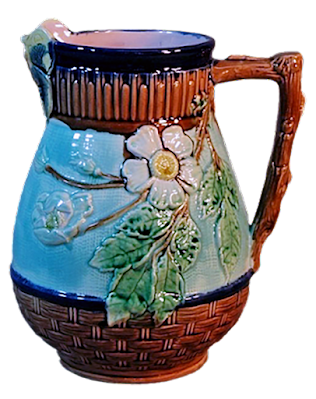














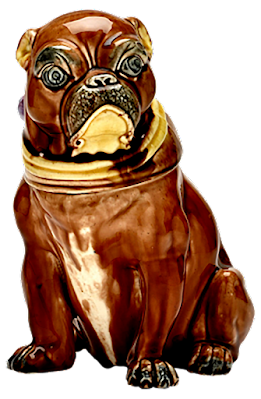


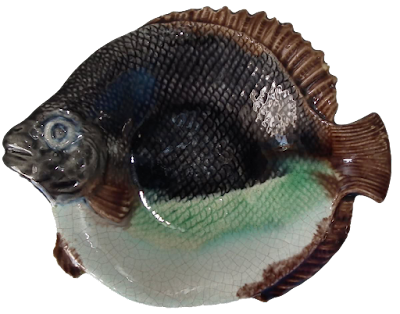






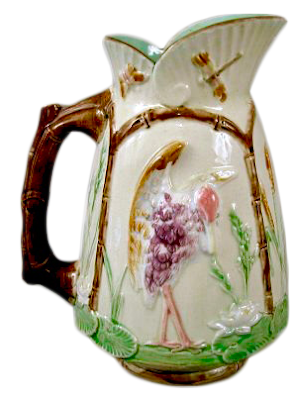



























































Thank you for the great information on Forrester pottery. I have a pair of the garden seats and they are marked SS or 55 but no names.
ReplyDelete